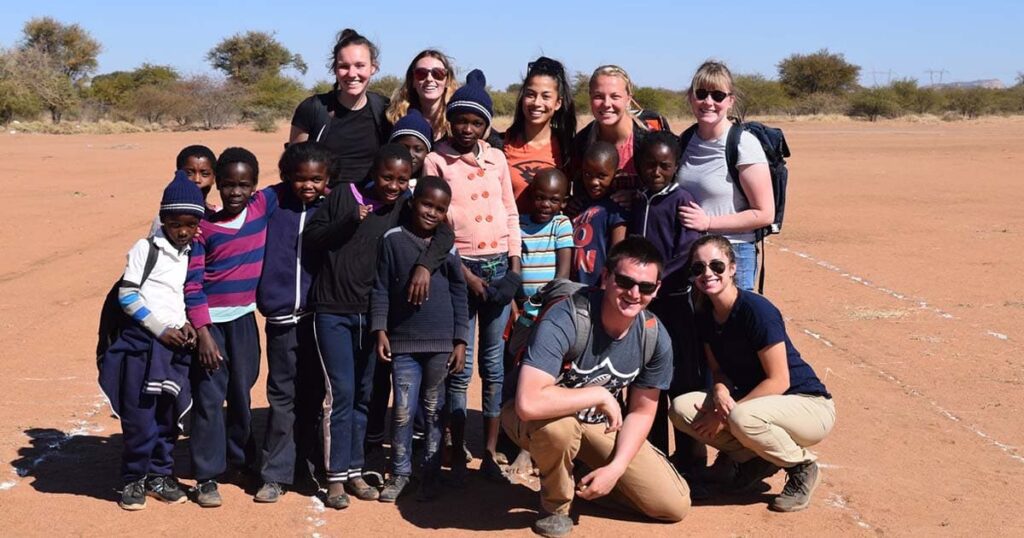
Studying abroad is often one of students’ most impactful college experiences. They immerse themselves in new cultures, learn alongside others in a different county and discover more about the world and themselves. What’s not to love?
That was the case for Courtney Jost, who studied abroad in 2019 as a part of the College of Public Health and Human Sciences’ Botswana program. She was in her second year of the college’s master of public health program studying global health.
For six weeks, Courtney and other students worked on projects related to their research interests within the Botswana community. For Courtney, that was evaluating disability resources in the Maunatlala village. She specifically focused on what disability resources were being offered, and how disability was perceived, by working with disabled individuals and those running programs in the community designed to support them.
When the summer ended, she hoped to return the following year as a doctoral student to continue her research. Then came COVID-19.
Taking what she had learned from her time in Botswana, Courtney and the team pivoted to a more virtual role, using disability educational modules she had developed and information received from locals in the village to guide their research back in the states.
“We wanted to let them know that we were still here. We’re still working. We’re still very interested, but we can’t travel. So, we had to figure out how to do that from the United States,” Courtney says.
One of Courtney’s classmates, who she worked closely with during the virtual experience, was MPH student Nate Capener. Nate originally intended to be involved in the program in person. However, as summer 2021 approached and much of the world remained heavily impacted by the coronavirus, the program remained virtual for another year.
“When Dr. Khanna offered us a virtual experience, I jumped at the opportunity to continue to be involved. I wouldn’t say I was actively seeking out a virtual experience, but I decided to participate in it because it seemed like the next best thing,” Nate says.
From the states, Courtney continued developing the education modules and began thinking of ways to transition the content to virtual settings in the case of another event that prevented the team from traveling again.

Nate dove into the policy side of disability in Botswana and throughout South Africa, finding information on Botswana’s current efforts, and also how it drafts policies for people with disabilities.
“This program is great because it encompasses people from all sorts of different backgrounds,” Courtney says. “I don’t have a policy brain, and even though Nate didn’t come with a background in disability, having his expertise in the policy side of things has been a huge help.”
Despite studying abroad from home, Courtney and Nate say there were positive outcomes with the experience that they may not have realized had it not been virtual.
“One of the benefits I saw was how strong our relationship is with the people we are working with. They were messaging me through WhatsApp or email and just being like, ‘Hey, when are you coming back?’ That was pretty cool,” Courtney says. “Also, it’s been an interesting experience to navigate COVID together. Even if it’s just through Zoom, it’s cool to see how people on the other side of the planet are working toward a common goal.”
“There were some real advantages to doing this experience virtually, even though these benefits are different from those I would have found in-person,” Nate says. “I learned a lot about disability policy in Botswana and throughout Southern Africa, and I had the opportunity to produce fairly extensive written research on the topic. Writing and creating research is huge to me, and the virtual experience allowed me to engage in that side of a global health program more than I would have otherwise.”
Both anticipate traveling to Botswana next year to continue their research and hope to publish their findings in a relevant journal.
“The first couple of weeks is really getting to know the area and the people. Nate plans to come with us in 2022, and although he doesn’t know the area yet, he has built some foundational relationships over Zoom with people there. I think it’s going to be a lot easier for us to smoothly transition and begin to implement some of these modules and use the information we’ve learned about disability policy,” Courtney says.
“I came out of this internship far better prepared to engage in global health moving forward than I had been going into the program, which I think speaks volumes of the quality of the program itself,” Nate says. “I’m very much looking forward to comparing the two experiences, the virtual and the in-person, and to having a very different level of engagement with the amazing people I have so far either only heard about or spoken with over Zoom in Maunatlala.”
Are you interested in studying abroad and/or making a difference in global health? Learn more about the CPHHS Botswana Internship Program and how you can get involved.